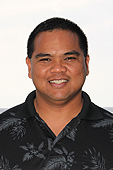 Scott Abrigo
Scott Abrigo
Aloha, my name is Scott Alika Abrigo. I reside in Malu’ohai, a homestead in Kapolei on the island of O’ahu, with my wife, Lehua, and three keiki, a son, Kawena (10) and daughters, Liko (8) and Pohai (1).
After graduating from Kamehameha Schools in 1989, I continued my education at the University of Hawai’i at Mānoa, where I received a BA in Liberal Studies with an emphasis in Land Use Planning and a Minor in Speech. Years later I decided to go back, and am currently a candidate for a Masters of Urban and Regional Planning degree.
Currently, I am on the board for Special Olympics of Hawai’i. I have previously served on the board for the Leeward YMCA and the nomination committee of the Aloha Council – Boy Scouts of America. I also volunteer my time by coaching youth sports, serving my homestead’s 501c3 organization (Kapolei Community Development Corporation) and supporting at my keiki’s Hawaiian-focused public charter school (Ka Waihona O Ka Na’auao).
For the past 13 years, I’ve worked as a planner for PBR Hawaii and currently manage PBR Hawaii’s Kapolei office. I’ve worked on variety of projects ranging in scope from island plans containing thousands of acres to site planning a community center. I’ve had the opportunity to work with our Ali’i Trusts and master planned educational facilities for Kamehamhea Schools and homesteadd for the Department of Hawaiian Home Lands throughout the State. I’ve also worked with Native Hawaiian communities on the island of Hawai’i, Maui, Moloka’i, Lāna’i, O’ahu and Kaua’i on issues pertaining to water, capacity building, income generation, community facilities, natural resource protection and land use.
Being a Kamehameha Schools alumnus as well as living on Hawaiian Homestead land, I recognize the cultural significance of planning and making every effort to provide culturally sensitive solutions. Over the years I’ve learned to listen to the client’s needs, the community and most importantly the ‘āina and collaboratively worked to produce a plan that is pono for everyone.
I am honored to be part of the First Nations’ Futures Program and look forward to applying what I learn from this program to the work that I do in the community and as a planner.
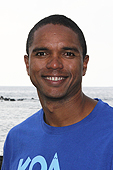 Thomas Anuheali’i
Thomas Anuheali’i
Welina mai kakou ‘o Thomas K. Anuheali’i ko’u inoa. No Nanakuli, O’ahu mai au. I graduated from Kamehameha Schools Kapalama 1998. I grew up on the shores of Nanakuli. I now live with my wife at Waikulu, Makaiwa, Honouliuli, Oahu. I currently serve as the Gill-Olson Joint Venture (GOJV) Ranger. It is within this capacity that I manage approximately 3500 acres of conservation, preservation and agricultural lands above the city of Kapolei. As the GOJV Ranger, I facilitate place based cultural education for private and public schools, Hawaiian Cultural Practitioners, civic groups and clubs. The cultural landscape of Palehua has shown many that “the ways of old, still lives on.”
I currently serve as Treasurer for Friends of Honouliuli, 501c3. Our mission is to preserve, protect and perpetuate the environment and Hawaiian culture thru stewardship and education. We host and facilitate community service projects and Hawaiian cultural venues throughout the Honouliuli region with focus on the mauka lands. I’m also an active member of Na Aikane O Pu’ukohola Heiau. It is an honor to be a part of this cohort. I am grateful for the many opportunities and experiences that have shaped my existence. I look forward to contributing to a future of positive generational growth within our Hawaiian communities.
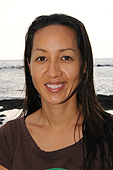 Kimi Makaiau
Kimi Makaiau
Aloha mai! I was raised in the ahupua’a of Kaipāpa’u and was so privileged to have spent my childhood exploring the mountains and oceans across Ko’olauloa and Waialua.
Currently, I’m employed as the Administrator of the Maritime Stewardship Program at ALU LIKE, Inc. Our active projects include a loko i’a restoration in Kawailoa and The Native Fishery Observer Program which recruits and trains Native Hawaiians and other Pacific Islanders to become longline observers in our Hawai’i and American Samoa tuna and swordfish fisheries.
After graduating from Kahuku High School, I attended Hawaii Pacific University, receiving a BSBA Degree in Business Management. It was during these college years that my passion for fishing matured along with my understanding of the need to protect our ocean resources.
Another project that I’m involved with is the Responsible Fishing Campaign sponsored by the Pacific Islands Fisheries Group. The campaign challenges fishermen to be responsible and do their part in maintaining our island fishing heritage and traditions. This is accomplished through promoting sound resource conservation and personal responsibility to ensure ample fish for futuer generations.
In my spare time, I enjoy bow hunting, fishing, and diving. I am also an active member of the Ko’olaupoko Hawaiian Civic Club and Mālama Loko Ea Foundation.
It’s an honor to participate in this year’s FNFP and I hope to use the knowledge and experience gained to further enrich the maritime projects that I am a part of.
 Corey Bragg
Corey Bragg
Kāi Tahu, Kāti Mamoe, Waitaha, Ngāti Kahungunu.
Corey Bragg joined the Centre for Sustainability Agriculture, Food, Energy at the University of Otago in July 2009. He is an Assistant Research Fellow, and has worked on the following projects: Te Tiaka Mahinga Kai focusing on fisheries management within taiāpure and mātaitai (Māori Fisheries Reserves); the Kia Mau Te Tītī Mo Ake Tōnu Atu research group on the sustainability of the tītī (muttonbird) harvest; and the Agriculture Research Group on Sustainability, assisting with ecological surveys. He is now working as a researcher on a computer support package for muttonbirding families. He is also the centre’s Kaiāwhina Māori, acting as the support person for students and staff.
Corey has a background in ecology, and also volunteers for a number of committees supporting Kāi Tahu. Corey’s research interests include conservation management, kaitiakitanga, and customary use of wildlife by Māori.
 Holly Coleman
Holly Coleman
My name is Holly Kilinahe Coleman, and I was raised in and still live in Mō’ili’ili on the island of O’ahu.
I graduated from the Kapālama Campus of Kamehameha Schools in 2002; after high school I went to the University of Pacific in California to pursue a Bachelor’s degree in International Studies, but I found that my na’au was still very much in Hawai’i! I returned home and attended the University of Hawai’i at Mānoa, which allowed me to continue my study of Hawaiian language, culture, and history. I finished my Bachelor’s in International Relations with a focus on Pacific and Hawaiian Studies in 2006, and also obtained a Master’s Degree in Hawaiian History in 2012. In 2009, I participated in the Smithsonian Summer Institute for Museum Anthropology in Washington D.C., where I was able to study Native Hawaiian cultura material and archival materials.
Currently, I am a Land, Culture, and History Research Analyst at the Office of Hawaiian Affairs, which has allowed me to use my education and experience to serve the Native Hawaiian community and to fulfill my kuleana to past, present, and future generations of this ‘āina. I hope to continue to contribute meaningfully to efforts to strengthen the lāhui, and I am very grateful to be a participant in the First Nations’ Futures Program!
 Kara Edwards
Kara Edwards
Kia ora koutou,
Aku mihi aroha ki a koutou – Warm greetings to you all.
I am Kara Edwards and I was born and raised in remote Awarua (Haast) on the South West Coast of New Zealand. I am an only child and for the first 5 years of my life, I was raised by my grandparents. I come from a large and close extended family and we have lived in the same area for the past 7 generations.
I have a strong affiliation to and involvement with my hapū, Kāti Māhaki and my iwi Ngāi Tahu and my family contiues to have an intergenerational involvement in iwi affairs. I have been on the Executive Committee of my hapū for the past 20 years and am the current Deputy Chairman as well as the chairman of our committee pounamu and I am a director in our Glacier guiding company.
I have a particular interest in iwi environmental matters and have a career in this field that spans 20 years starting with regional authorities, iwi authority and now the government. I am currenlty employed in a senior managment role with the Department of Conseration as a ‘Strategic iwi relationship Manager’.
I am the proud mother of two beautiful children, Kahurangi (17) who is in his last year at a Catholic Māori boarding school and is about to head off to Canada for his gap year and daughter Nikki-Leigh (21) who is about to start her career working for our people also in an environmental role.
I am most passionate about my people and our place in the world and feel incredibly grateful and excited to be doing the work that I do and living on the West Coast amongst my people.
I am ecstatic about this amazing opportunity and looking very much forward to meeting you all and experiencing Stanford.
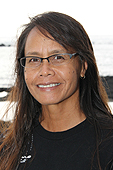 Malia Ellis
Malia Ellis
My name is Melanie Malia Kauila Ellis. My family line if from Kalapana on the Island of Hawai’i. I was born on O’ahu, attended Kamehameha Kapalama for primary school and then moved with my ‘ohana to Benicia, California, located in the East Bay of San Francisco.
After graduating from Benicia High, I returned to Hawai’i to attendWindward Community College and UH Manoa where I received a B.A. in Elementary and Early Childhood Education. I currently work at our Kamehameha Preschool in Waimanalo in the P3 program.
I practice La’au Lapa’au, traditional Hawaiian Lomi and the Art of Lua with Pa Ku’i A Holo. I am an avid water baby who loves to paddle surf, dive and gather mea ‘ono from the ocean to feed my family and myself. I am proud to be Kanaka Maoli and to practice the things my Kupuna have taught me.
I am grateful for their spiritual presence and guidance in my life and continue to nohona Hawai’i to honor them and my ‘ohana.
I am truly blessed and honored to be a part of the First Nations’ Futures Program and look forward to collaborating with other Native Hawaiian leaders in the year to come.
Mahalo Ke Akua me na Kupuna.
 Rachael Harris
Rachael Harris
Tena Koutou
Ko Taranaki te Maunga
Ko Tokomaru te Waka
Ko Mohakatino te Awa
Ko Ngāti Tama te Iwi
Ko Pukearuhe te Marae
Ko Rangiwhakahotu White te tupuna
Ko Rachael Harris ahau.
My name is Rachael Harris, and I live in Christchurch, New Zealand. Born and raised in our capital city, Wellington, I am currently studying at the University of Canterbury, in the final year of my Bachelor of Law and Bachelor of Arts, majoring in Māori and Indigenous Studies and minoring in Geography. Locally, I volunteer for the Canterbury Community Law Centre, a volunteer organisation staffed by local lawyers, students and graduates that provides free legal advice and representation for those in need.
My studies have led me to develop a particular passion for the interrelationships between the law, environment interests, and the interests of Indigenous Peoples. Next year, I intend to undertake a Masters of Laws at Canterbury, in order to research and develop a management plan between local iwi and regional councils relating to the co-guardianship of water. Water management and Māori interests are highly relevant at this time, as the battle over the sale of State Owned Assets rages across the New Zealand political spectrum, and I am very interested in the varying approaches taken to water management across the world, particularly with regard to Indigenous interests.
The relevance of building a sustainable tribal economy was driven home to me earlier this year upon the announcement that my own iwi, Ngāti Tama, had lost the majority of its Waitangi Treaty Settlement. Living in the Ngāi Tahu rohe, the bankruptcy of my iwi is a stark contrast to the success of Ngāi Tahu ventures that I see every day. Although we have lost our putea, this does not mean we are impoverished. We can rebuild, it will take time and commitment, but most of all knowhow. This begins with knowledge, and applying that to the problems our iwi and our people face. I wish to be part of that. I am honoured to be a part of the First Nations’ Futures Programme, and greatly look forward to using the knowledge gained from the experience to help my community.
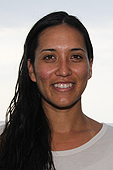 Umi Jensen
Umi Jensen
Aloha! My name is Joan Umiokalani Jensen, better known as Umi. I am named after my grandmothers and represent them and their families hailing from both Utah and Ko’olau Loa. I was born and raised in Hau’ula and continue to call it my home today where I live with my brother. I attended elementary school there and then made the long bus rides to Kamehameha starting in the 7th grade. I graduated in 2001 and later studied at Stanford University, completing a BA in Comparative Studies in Race and Ethnicities and a MA in International and Comparative Education in 2006. With the intention to educate myself and return to serve the people of Hawai’i, I focused much of my studies on indigenous peoples and got to visit with many native communities all over the world. After finishing school, I decided to serve a full-time mission for the Church of Jesus Christ of Latter-Day Saints and spent nearly two years with the beautiful people of South Korea.
Although my life has taken me to many countries and beloved places, I know that Hawaii is where I belong, and serving my community is what I want to do. I have been fortunate for the last three years to be able to use my education and passion for serving the Native Hawaiian community as a Research Assistant at Kamehameha Schools. Whether it’s research, evaluation, or strategic planning, I was able to work every day for the special mission KS takes on. Outside of the office, I’ve also spent the last three years working with other Hau’ula community members on inspiring projects and partnerships from resource stewardship to ocean education, from emergency preparedness to heiau restoration. I’ve recently decided to take the plunge and dive right into this community work to foster positive change at home through a variety of small grants. I will contribute to the management and creation of community programs for Hau’ula and other Ko’olau Loa communities and look forward to how my involvement with FNFP will shape and guide my efforts at home.
I first heard of FNFP and even participated in the fellows’ first visit to Stanford when I finished my graduate degree, and now things have come full circle and I’m finally able to participate as a fellow. I am excited and grateful for this opportunity and hope to use this experience to further my work at home and to develop as a servant leader of whom my community will be proud.
 Anthony Lindoff
Anthony Lindoff
Waa sa iyatee! My name is Anthony Lindoff and I was raised in Hoonah, Alaska – a small community on Chichagof Island approximately 40 miles west of Juneau. I’m Tlingit and Haida Indian. My Tlingit name is Kaakootee, and I’m Kaagwaantaan (Eagle Wolf Clan) from the Gooch Hit.
I graduated from Fort Lewis College (’08) with a B.A. in international business. While attending FLC, I was a member of the Native American Honor Society and served as president of the American Indian Business Leaders – FLC chapter. I was also fortunate enough to spend a semester studying abroad in the wonderful city of Regensburg, in Bavaria, Germany.
While earning my degree at FLC, I completed two internships with Sealaska, working for the Office of Diversity Solutions. I joined Sealaska in summer 2008 as a business development analyst working for the office of the executive vice president, where my first task was to help draft Sealaska’s “Southeast Alaska Economic Development Strategy.” I currently serve as mariculture program manager for Haa Aani, LLC – Sealaska’s newest subsidiary, dedicated to improving the economic conditions in Southeast Alaska communities through innovation, sustainability and collaboration. I feel truly blessed to be working for Sealaska in my current capacity as my heart is and will always be in rural Southeast Alaska. To be able to provide hope and opportunities for our tribal member shareholders living in our traditional communities is literally a dream come true.
As mariculture program manager, I’m currently spearheading an initiative to facilitate the creation of a viable oyster farming industry for our Southeast villages, so as to provide sustainable, year-round jobs that are lifestyle compatible. I also serve as a board member for the Alaska Shellfish Growers Association.
In my spare time, I’m usually hunting deer, subsistence fishing, or participating in some other traditional food gathering expedition.
It’s an honor to be able to participate in the FNFP, and I look forward to meeting and learning from the other fellows.
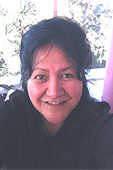 Donna Matahaere-Atariki
Donna Matahaere-Atariki
Donna began teaching in Community and Family Studies at Otago University in 1995 before leaving in 2000 to take up a position with Ngāi Tahu Development Corporation as tribal education manager later transferring to the senior executive team in the Office of Te Rūnanga o Ngāi Tahu. During this time she was key in the development of memoranda between Ngāi Tahu and the Ministry of Education while also serving for a number of years on the council at the University of Canterbury.
Donna has also spent time in the public sector as a policy Director at Te Puni Kokiri responsible for research, international issues and the monitoring of public sector agencies in line with the Māori Development Act.
She returned home to Dunedin in 2007 to be closer to her whanau and is currently executive director of Arai Te Uru Whare Hauora a community based provider of health and social services. She is a miniterial appointment to the Univsersity of Otago Council and the New Zealand Council of Legal Education. A Trustee of the Southern PHO she is eager for changes in primary health that effect measurable outcomes for Māori and other peoples.
Donna is also a member of the Family Services National Advisory Council, an elected membr of the Ministry of Health NGO Working Group and an NGO representative on the National Taskforce for Family Violence.
Her big passion is whanau and the quality of outcomes that the receive from their engagement with education and other statutory agencies. Elected Chairperson for Bathgate Primary she remains committed to ensuring community participation and local decision-making. Donna has recently been appointed a member of the National Māori Leadership group for Cancer.
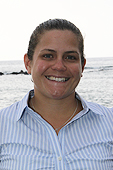 Ke’ōpū Reelitz
Ke’ōpū Reelitz
Aloha, my name is Ke’ōpūlaulani Reelitz. Although I was born and raised in Kāne’ohe in Ko’olaupoko on the island of O’ahu, I always envisioned a life away from the islands. I left O’ahu after graduating from Kamehameha Kapālama in 2002 for the foreign and frigid land Midwest. I earned my Bachelor’s of Arts with a double major in Political Science and International Studies from Loyola University Chicago in 2006. But, it was an interest in integrating critical race and gender studies into law and politics that led me to the University of Arizona James E. Rogers College of Law, home of the Indigenous Peoples’ Law and Policy Center. I received my juris doctorate from the University in 2009 and took and passed the bar exam in February 2010. I spent much of my four years in Tucson working for the Pima County Government in the Attorney’s Office’s Civil Division and the Sheriff’s Department.
In September 2010, the call from ku’u one hānau resounded through my world. On one ordinary evening as my friends and I drove from Tucson to El Paso for a cycling event, my mother called to inform me that my beloved father had suddenly and unexpectedly passed. I was on the very next flight home, and within days I knew the right decision was to return. So, I packed up the life I had made for myself on the continent and returned home to heal and build a new life with my ‘ohana any my Hawai’i.
Although the transition was not always smooth, I slowly rebuilt a life here in Hawai’i that I love. I worked to re-root myself in the Hawaiian culture I was raised in, which is what led us to found Nā Wāhine ‘Ōiwi. Our group aims to provide a safe space for Hawaiian women to re-root themselves and connect within, with each other, in our communities, and with our culture and traditions. Re-rooting myself in my culture is also what got me in a wa’a at Lōkahi Canoe Club where I was lucky enough to cross the Ka’iwi Channel in the 2011 Nā Wāhine O Ke Kai.
I currently work at Argosy University as an Adjunct Instructor in the Criminal Justice Undergraduate program. I am honored and humbled by this opportunity to particpate in the First Nations’ Futures Program.
 Nathan Soboleff
Nathan Soboleff
My name is Nathan Soboleff and I was born and raised in Juneau, Alaska. I am Tlingit, Haida and Norwegian. My Tlingit name is KHA Kee nā and I am Raven L’eeneidi (Dog Salmon Clan) from the Central House in Angoon.
I graduated from Oregon State University’s College of Forestry in 2001 with a B.S. in natural resource management. In 2006, I graduated from the University of Alaska Fairbanks School of Fisheries and Ocean Studies with a M.S. in fisheries management.
During my undergrad, I interned with Sealaska in the Natural Resources Department and for the Bureau of Indian Affairs, Alaska Region’s Natural Resource Department. Between colleges I worked for the Alaska Department of Fish and Game in the Division of Subsistence Management. I currently serve as a marine mammal tagger for the U.S. Fish and Wildlife Service, tagging subsistence harvested sea otters, walrus and polar bears. I periodically sit as an advisor for the Alaska Native Harbor Seal Commission, and conduct bio sampling and hunter harvest surveys for them.
As the renewable energy program manager for Haa Aani, LLC, I have been responsible for bringing the wood pellet heating industry to Alaska, and for making energy more affordable for Alaskans. Many Alaskan communities have been paying upwards of $10 a gallon for fuel, and paying nearly $0.80 per kWh for electricity. High energy costs in our smaller rural communities have caused people to increasingly move to more urgan communities and give up their traditional lifestyles. Affordable, renewable energy has repeatedly been highlighted as a top priority for Native Alaskan people. Using a holistic approach I also work on issues of food security and couple energy projects with agriculture using waste heat. As an economic developer I am constantly looking at ways to improve economic conditions in our communities. Examples of this include adding solar power to fish processing plants, and findig new and innovative uses of existing infrastructure and using them on a year-round basis instead of just seasonally.
In my spare time I enjoy fishing, hunting and boating or building my home for my wife and three children.
It’s an honor to be able to participate in the FNFP, and I look forward to meeting and learning from the other fellows.
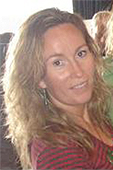 Paulette Tamati-Elliffe
Paulette Tamati-Elliffe
Paulette Tamati-Elliffe is from Ōtākou and is a Ngāi Tahu/Te Ati Awa descent. Paulette is a recent graduate of Te Panekiretanga o Te Reo – Institute of Excellence in Te Reo Māori.
Paulette is currently the project leader – KMK Te Reo Strategy for the Culture and Identity team at Te Rūnanga o Ngāi Tahu and has been involved in the revitalisation of te reo among Ngāi Tahu whānui and the wider community for a number of years.
She is the mother of four bilingual boys, composes and performs waiata and also co-tutors kapa haka with her partner.
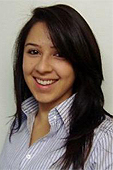 Jessica Templeton
Jessica Templeton
Waikato Tainui descendat, Jessica Templeton, was raised in Hamilton, New Zealand and now resides as a postgradute student at the University of Canterbury. Building on her Bachelor of Science, she is currently midway through a Master of Engineering Management. Her postgraduate programme is designed to equip engineering and science students with essential commercial skills required for organisational leadership, typically a competency learned in industry five to eight years into a professional career. This is a significant capability for facilitating the transformation of our country into a knowledge nation for sustainable economic growth. Outside of academia, she is president of a local residents association and mentors younger Māori students. She has a recent record with leading an enterprise resource planning implementation and leadership and a senior resident advisory role. The combination of her education, community involvement and leadership aspirations has earned her the prestigious Rose Hellaby Postgraduate Scholarship, Ngā Manukura Āpōpō, Māori Leaders of Tomorrow.
Jessica is particularly interested in enhancing the country’s tribal economies, as these have in the past been inhibited, and on a larger scale slowed national economic growth. She intends to support positive change through holistic, dynamic and educated development initiatives to ensure sustainable indigenous growth.
She is humbled and incredibly grateful to be part of the First Nations’ Futures Programme. Jessica is enthusiastic about this opportunity to share insights, experiences and knowledge with an inspiring group of FNFP fellows to construct alternative perspectives and methods which she looks forward to conveying and implementing within her community.
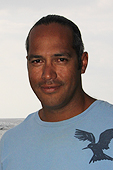 Keahi Warfield
Keahi Warfield
Shadd Keahi Warfield is of Hawaiian-German descent and is a product of the Hawaiian homestead community of Keaukaha in which he was raised. He has managed to return to his community home as a teacher, mentor and coach for the youth of his community. His true passion and innovation for youth emerges as the visionary in the creation of a 21st century afterschool program known as RISE. His focus is to reveal the individual strengths of his students for excellence. His life work prioritizes around the well-being and self motivating factors that help youth ages 12-18 recognize their individual potentials and opportunities in life. His continued growth in understanding the traditional arts of Hawaii contributes as the conduit in which he utilizes to bridge and also break the barriers that challenge our youth on a daily basis. He is constantly fueled by the amount of young people that he can reach and knows that at the end of the day, the hope is that they make the right decision to sustain a balanced living. He plans to establish a doctoral study into his 21st century afterschool program that will work for his community and beyond.


